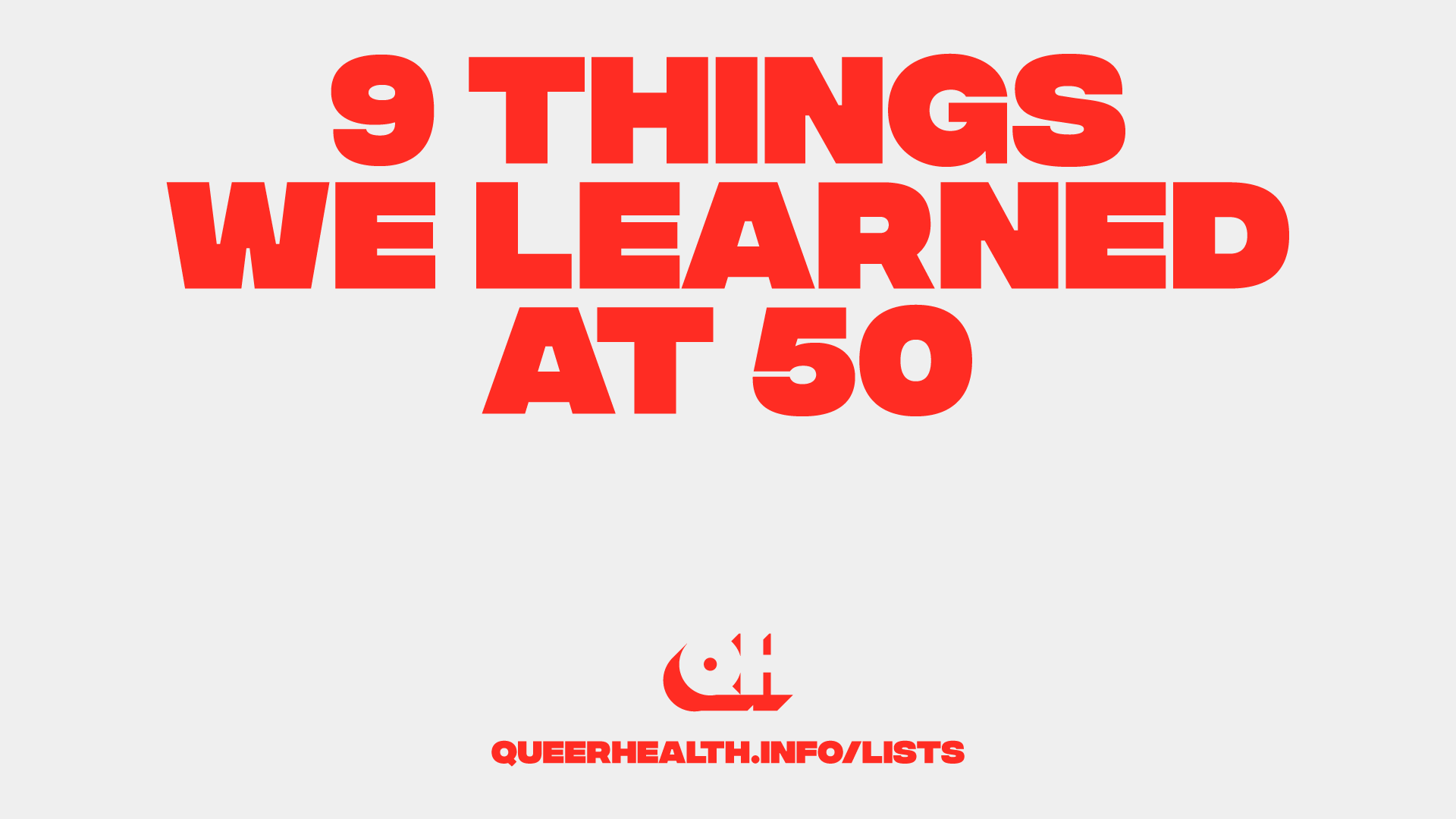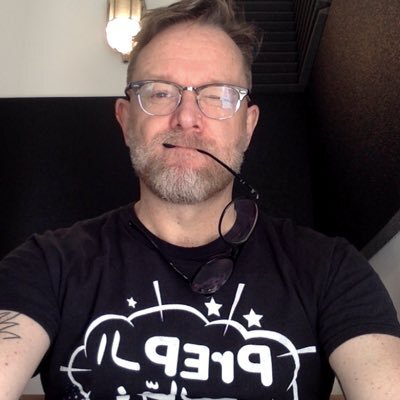
QH LISTS
9 things we learned
at 50
You're 50? How did that happen?!
Marc and Will, both cis queer men in their 50s talk about the importance of friendships, mentoring, and becoming just like our parents.
-
-

Will
TWITTER: @DrWillN
INSTAGRAM: @dadbod_momjeans -

-
1. Knowing when to walk away
Will: At a conference in Melbourne in 2006, my colleague, friend and mentor Michael Hurley was asked a question by an audience member. What advice would he give to an HIV negative man involved in a group sex scene when he was about to put himself at HIV risk? Michael's answer stuck with me - and has stayed with me ever since. Michael's response was: walk away.
Michael's advice resonated with me because I'd used that strategy many times in my past - and since - and in a pre-PrEP era I know that walking-away helped me to remain HIV negative.
Getting to 50 taught me something else about walking-away: from time-wasting and useful online 'battles'; from connections that are no-longer fulfilling; and from habits that need breaking.
2. No matter how hard you try parts of you will become your parents
Marc: We all rebel against our parents. Their politics, dress sense, taste in music, their religion. And often for good reason. Who wants to carry the bigoted or old-fashioned views of the previous generation into the future? Yet here I am a bit grumpier, a little less tolerant, asking to turn the music down and not quite understanding what ‘they’re wearing’. It’s all good.
3. Simplify your life
Will: During one of the most stressful periods of my life, someone who grew to be a beautiful partner-in-crime (Ajamu - checkout his stunning photography) took me aside and fed me a reading list of books about simplification. "You've got too many pots on the boil at once" he told me. "Read one of these books and cut out all the stress".
As I hit the start of my sixth decade, re-simplifying my life has become more important. I've cut out booze (for now), learnt the joys of hibernation, and re-learnt the power of saying 'no'. Simples!
4. Be proactive about your health
Marc: At 50 I realised that my body has been good to be no matter what I threw at it.
I spent a huge amount of my 20s, 30s and even some of my early 40’s partying, eating what that hell I liked, smoking, drinking, and taking all the party drugs I could lay my hands on. I hardly saw the inside of a gym and relied on good genes, dancing every weekend and high metabolism to keep me slim and trim.
Now the time has come to pay it back with love, kindness, and care.
Find ways to repay all the hard work your body did on its own. Choose exercise and diet that nourishes your body and mind. You’re more likely to find me on a yoga mat on a Sunday morning than coming down at a chill-out. And life’s better for it.
5. Friendships matter
Will: At the start of my 40s I was part of the biggest east-London queer gang. Over the decade that followed we got new partners; our interests shifted; we outgrew each other; or we moved away (thanks Brexit).
I know we might’ve spread ourselves too thin, but as I hurtled past 50, I saw my friendship circle shrink. And, whilst I’m still welcoming new friendships into my life, those I still have mean the world to me.
We need each other’s backs more than ever; we need someone to pick the phone up to who understands what we’re referencing; and we need to talk to people who know what we’re going through.
Those friendships at 50 really matter.
6. Be proactive, not reactive
Marc: Don’t spend time looking at what others AREN’T doing, get on and create your own.
We can spend so much time observing what others are creating or how they are trying to change the world. We might get frustrated that they aren’t doing it quite ‘right’ or not they ways we would. That takes up energy that could be used to create an alternative approach or something that sits alongside and compliments their work. I’ve learnt that my frustration is more about me not doing than ‘them’. I’ve taught myself to be ‘better not bitter’. Out of that attitude has come great work.
7. The map of mentoring
Will: "When are we going to talk about the struggle of growing to become the queer elders that those coming after us deserve/the ones we longed for in our younger years?" posted Xander on Twitter.
Xander’s post struck a chord with me: whilst I’ve been fortunate enough to have some stunning mentors (see above), I also noticed the empty chairs as I grew up, and the experiences I didn’t get to learn from.
After I hit 50, and the calls for me to offer mentorship as an elder started to grow, I realised I didn’t have a rule book – there is no map of mentoring.
But my big mentoring learning is this: knowledge and growth doesn’t (only) come from elders to younger generations. I’m richer because of all the things younger people teach me.
I’m adding this to the map.
8. My heart is as vulnerable and as easily broken at 50 as it was at 17
Marc: As I got older, I thought I had the relationship thing sorted. I’ve gained all the tools and experience, yet age is no protector for heartbreak in love. This sounds sad but it also reminds me that if my heart can be broken and I can feel that pain, then surely, I still have the capacity for my heart to be filled with love and romance. After all, they are two sides of the same coin.
9. We can’t live someone else’s life
Will: I’m almost as old now as my old man was when he died. Straight after his funeral, a well-meaning peer of my dad’s took me aside and said: “you’ve got to live twice the life now. Do all the things your father didn’t get the chance to do”.
The problem is, those of us who have thrived and survived can’t keep piling on the responsibilities to live the lives of those who died too soon. We can’t make-up for their lost years. We can’t keep doing the things, visiting the places, taking the responsibilities for those who “didn’t get the chance”.
Because by trying to do so, we end up not living our own lives. Now, I’m living my life for me.
